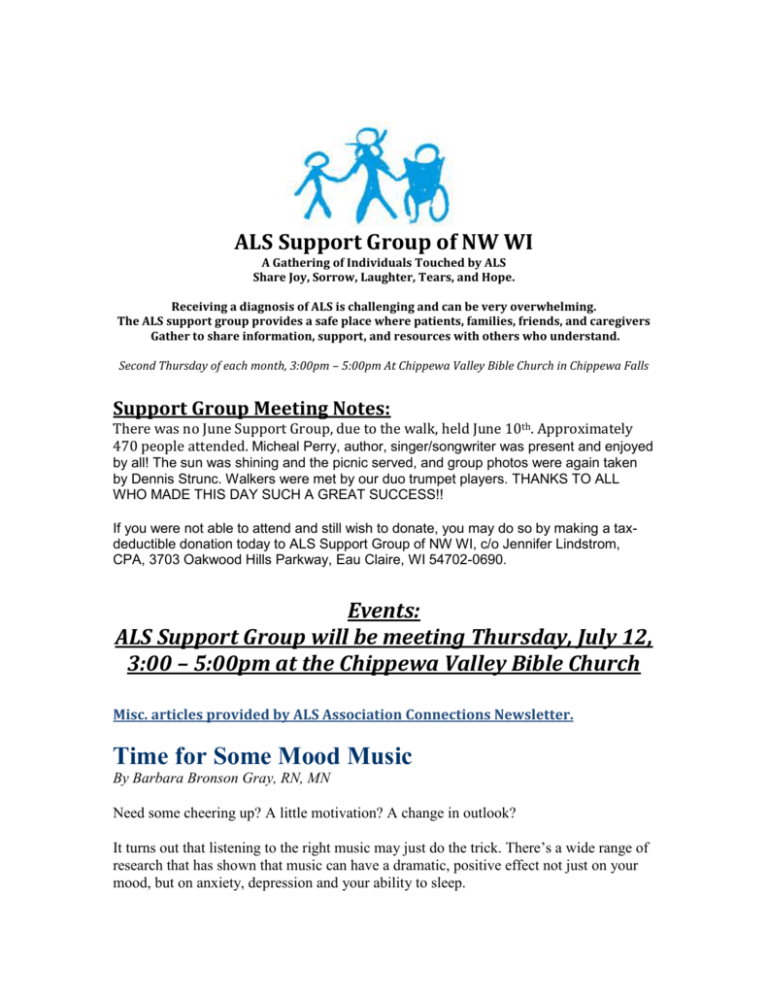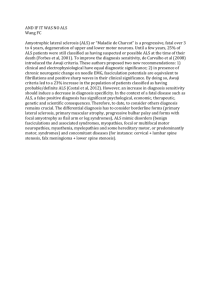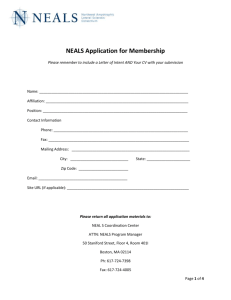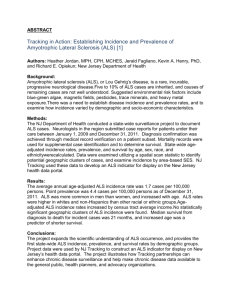June - 2012
advertisement

ALS Support Group of NW WI A Gathering of Individuals Touched by ALS Share Joy, Sorrow, Laughter, Tears, and Hope. Receiving a diagnosis of ALS is challenging and can be very overwhelming. The ALS support group provides a safe place where patients, families, friends, and caregivers Gather to share information, support, and resources with others who understand. Second Thursday of each month, 3:00pm – 5:00pm At Chippewa Valley Bible Church in Chippewa Falls Support Group Meeting Notes: There was no June Support Group, due to the walk, held June 10th. Approximately 470 people attended. Micheal Perry, author, singer/songwriter was present and enjoyed by all! The sun was shining and the picnic served, and group photos were again taken by Dennis Strunc. Walkers were met by our duo trumpet players. THANKS TO ALL WHO MADE THIS DAY SUCH A GREAT SUCCESS!! If you were not able to attend and still wish to donate, you may do so by making a taxdeductible donation today to ALS Support Group of NW WI, c/o Jennifer Lindstrom, CPA, 3703 Oakwood Hills Parkway, Eau Claire, WI 54702-0690. Events: ALS Support Group will be meeting Thursday, July 12, 3:00 – 5:00pm at the Chippewa Valley Bible Church Misc. articles provided by ALS Association Connections Newsletter. Time for Some Mood Music By Barbara Bronson Gray, RN, MN Need some cheering up? A little motivation? A change in outlook? It turns out that listening to the right music may just do the trick. There’s a wide range of research that has shown that music can have a dramatic, positive effect not just on your mood, but on anxiety, depression and your ability to sleep. Neuro-scientists and psychologists say it doesn’t matter whether it’s classical, country, rock, jazz, oldies, new-age or the simple repetition of ocean waves, as long as the music fits your mood and your taste. Researchers at Penn State University studied college students’ response to music as reported in their listening diaries. The research, published in Psychology and Education, showed the students had more positive emotions after listening to music. It didn’t matter if they listened while driving or during another activity, or if the music was playing while they socialized with friends. After listening, the students were more friendly, relaxed, calm, optimistic and joyful; they also were less pessimistic and sad. A new book, Your Playlist Can Change Your Life, by Joseph Cardiollo, Don Durousseau and Galina Mindlin, suggests we should choose our music carefully, selecting music to either mirror our moods or change them, depending on what we’re feeling. They say the speed of a song is a critical feature, as is the emotional connection you have with the music. Pairing the music to your mind-set is helpful. A mis-match can put you out of sorts, or make you feel anxious, the authors say. You also should carefully choose how you listen to music. Do you like sitting quietly by yourself, perhaps with ear phones or ear buds plugged into your iPod? Or do you prefer to hear the music fill the entire room through speakers, allowing you to share the moment with others or just appreciate the depth of the sound? For those with mobility challenges, having a variety of favorite playlists queued up and ready to roll can make it simple to select songs based on your mood at the time. MP3 devices, iPods, iPads, laptops and computers can all make it easier to make selections while you’re comfortably seated or lying down. The iPad has a few features designed for users with impaired physical and motor skills, including a large multi-touch display that requires no physical force and a built-in zoom function to magnify the entire screen, making it easier to touch smaller links, buttons and images. Research Update The ALS Association Announces New Research Grants The ALS Association’s TREAT ALS (Translational Research Advancing Therapies for ALS) Portfolio is a research endeavor enabling important global research to progress from the laboratory to the bedside. The focus of the program is to support novel ideas, build tools, partner with academia and industry to identify new potential therapies, and support the infrastructure for clinical trials with the goal to find meaningful treatments and a cure for ALS. The Association is pleased to announce seven new grants. These grants focus on understanding disease mechanisms, the development of induced pluripotent stem cell lines as model systems to test compounds, the development of mouse models, and approaches to treating the disease linked to the recently identified mutation C9orf72. http://www.alsa.org/news/the-als-association-announces.html Ask the Doc: by Edward Kasarskis, M.D., Ph.D Edward Kasarskis, M.D., Ph.D. is Director of the multidisciplinary ALS Center at the University of Kentucky Neuroscience Center in Lexington, Kentucky, professor in the Department of Neurology at the University of Kentucky, and Chief of Neurology at the VA Medical Center in Lexington KY. Q: With spring here, I’m starting to feel the onslaught of hay fever and I find I’m coughing, sneezing, groggy and fatigued, and my eyes are itchy and watery and my nose is running. It’s hard to deal with these symptoms on top of the challenges of ALS itself. What do you suggest? A: When you hear people complain about their hay fever, they often say, “I’m so stuffed up,” or “I have trouble breathing.” For people with ALS, it’s more than simply an inconvenience. If you’re already having trouble coughing up secretions and swallowing effectively, hay fever or upper respiratory allergies can make you miserable indeed. To make matters worse, experts are saying that the mild winter temperatures in many parts of the country have caused an earlier-than-usual release of tree pollen, a common trigger for hay fever. And allergists predict a longer and more intense allergy season than we usually have. ALS complicates hay fever. Depending on your situation, you may have trouble taking in the air necessary to sneeze effectively. Allergies stimulate the creation of secretions, and decreased respiratory capacity can make it difficult to cough deeply enough to clear your lungs and throat. On top of that, some allergy medications can cause drowsiness, which can complicate your breathing when you lie down. There are some things you can do to feel better: The more you can reduce your exposure to allergens causing your hay fever the better you’ll feel. Keeping your windows closed, having a special filter on your heating and cooling system and minimizing the indoor dust and pollen count by vacuuming thoroughly regularly with an allergyprevention filter may help. Keep hydrated to help thin your secretions; they’ll be easier to cough up. Use nasal sprays to moisten your mucous membranes in your nose (although sniffing the sprays depends on your ability to take in a deep breath). Talk to your general practitioner or internist about what medications they recommend. Some over-the-counter medications, such as Claritin® (loratidine) treat runny nose, itchy, watery eyes, sneezing, and itching of the nose and throat. Non-drowsy formulas are available and you typically take one 10 mg tablet. Eye drops and nasal sprays are also available. Ask your pharmacist to check to be sure any over-the-counter or prescription drugs you may start taking for hay fever and upper respiratory allergies won’t interact with the medications you’re already on. Allergy shots may be an option for you but they typically take several months to be effective. Your doctor may recommend you see an allergist, if necessary. If you use BiPap, be sure you’re getting humidified air. (Some thirdparty payers are reluctant to cover the extra cost). The extra moisture will help prevent your nose, mouth and throat from drying out and will make it easier for you to deal with the additional secretions the allergy causes Talk with your ALS neurologist and clinic team members about the benefits of using a cough- assist device. It’s a noninvasive therapy that safely removes secretions in people who can’t cough effectively (peak cough flow less than 270 l/m). A cough-assist device clears secretions gradually by applying a positive pressure to the airway, then rapidly shifting to negative pressure, which produces a high expiratory flow, much like a natural cough. It’s easy to use and a good alternative to suctioning; and it can be used with a face mask, mouthpiece or an adapter to a person’s tracheotomy tube. It is not just for the allergy sufferer with ALS, but helpful for many ALS patients at a certain stage of their illness Please let us know if you no longer desire to receive a copy of the ALS Monthly Report as we will gladly remove your name from the list. Thank you. Take good care. Julie Chamberlain, LPN ALSNWWI Patient Services Outreach 715.271.7257 alsnwwi@gmailcom www.alsnwwi.org






